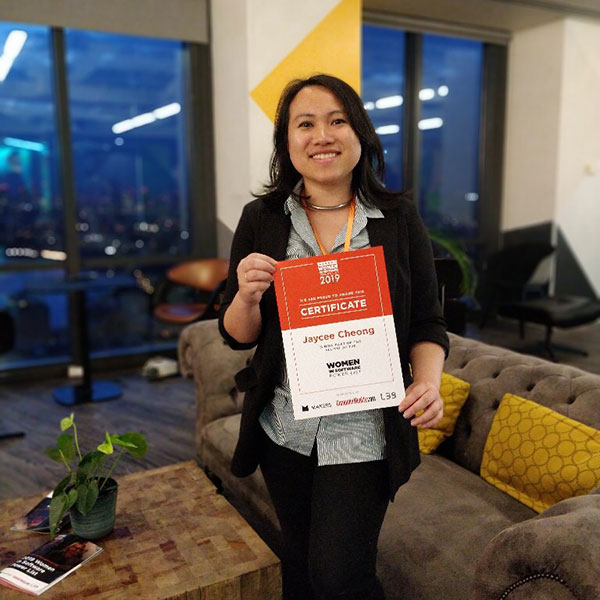This year software bootcamp Makers Academy released its first Women in Software power list. Created to recognise the best of the coding community, the list of thirty includes startup CTO’s to PhD students who are going above and beyond in tech leadership.
Making it onto the list was also Jaycee Cheong. After deciding to re-train as a developer, Jaycee attended Makers Academy just two years ago and joined Simpleweb as her first job as a software developer.
She’s since gone on to grow the team at cyber-skills startup Immersive Labs and can be regularly spotted in the wilds of Bristol’s tech and digital meetup scene, passing on her skills and knowledge and mentoring others to help them achieve their best.
We got together to hear her thoughts on leadership, closing the skills gap and championing diversity in tech. Here’s what she has to say:
Alice: What skills do you think make a good leader in tech?
 Jaycee: All leaders will all have their own style, but listening, coaching and supporting are really important to me.
Jaycee: All leaders will all have their own style, but listening, coaching and supporting are really important to me.
Tech requires quite a creative set of skills and a lot of people don’t realise that, as a leader, you need to foster the creativity within your team in order to be able to lead them to build stable software.
You also need to be able to trust your team in order to achieve company goals and to do that you need to pass on knowledge and skills. Rather than telling people what to do you’ve got to help them figure out how to do it themselves.
Alice: Are there any leadership skills you think are also really important, but are often overlooked?
Jaycee: When I was working with developers, they were really great at teaching me technical skills. However, when I had big ideas it was the leaders with the mentoring and coaching skills that I felt more comfortable talking to because they could help me make things happen.
Everyone can play a leadership role in their team
At the moment not many tech companies think these are important skills but if you want to grow your business you need to have really good people managers in the mix. You can always upskill them on the tech side of things if that’s required, or defer those to a senior developer.
If you don’t have good leaders in place to help people to progress then they’re going to feel stuck and they’re going to move on – and when you have a leaky bucket, you can’t grow.
Alice: What advice would you give to other women who want to become leaders within the tech industry?
Jaycee: Go for it! I’ve not actually been in software development for very long. But in the first couple of months as a developer at Immersive Labs, I realised that what was required in that organisation was not so much developers but a process for how to grow the business and build a platform.
I ended up putting on different hats for different scenarios and learning that way. If you want to get into leadership, talk to your manager or anyone who can help you get a taste of it.
The thing that often needs fixing in organisations is the communication
I’m currently mentoring one of my team members who wants to learn more about leadership because ultimately leadership isn’t just a title, everyone can play a leadership role in their team.
On the flip side, you do need to figure out how much you’re willing to take on and make sure that the work you do is recognised. Women tend to end up doing a lot of the ‘glue work’ – the communication, documentation and the ‘non-technical’ work and then get overlooked for leadership roles for not being “technical enough”.
The things that often need fixing in organisations are the communication, the processes and getting the team to work together – those arw the things I would consider to be a leadership role but more often they’re seen as non-technical work so people don’t tend to get recognised for it.
Alice: If a woman in tech was doing a lot of leadership work and not being recognised, how would they go about changing this?
Jaycee: This certainly needs a bit of courage in terms of challenging that perception.
Sometimes it’s just about making sure that you and your manager are on the same page. You can say to them: “Here are the things I’m doing. Are they going to help me get a pay rise?”
As a manager I prefer when people are really direct, telling me exactly what it is they’re looking for – because then I can help them figure it out.
If a company doesn’t value your leadership skills and potential then frankly there will be other places that will
Particularly when it comes to pay and promotions, these can be really uncomfortable conversations – but if you’re not letting anyone in the company know how you’re feeling and what you’re looking for then there’s no one else that will be able to help you.
Other times it helps to put things into numbers, so exploring how much time you spent smoothing over a problem that has saved the organisation money in the long run. If you put it into financial terms you can say: ‘If I wasn’t spending time solving problems with the team and our communication with clients then we’d keep losing money and staff and keep having to hire new people, how much money would we have lost there?’.
If you’ve tried everything and it doesn’t work, go somewhere that will recognise your contribution. If a company doesn’t value your leadership skills and potential then frankly there will be other places that will.
I’ve been listening to a podcast called Radical Candor which is a really good resource for people that want to get into leadership and management. At the end of each episode, they give you tips on how to manage situations such as doing work you’re not recognised for and they always say ‘don’t forget to quit’.
Alice: What is the number one thing you’d tell the ‘you’ that first got into the software development industry two years ago?
 Jaycee: After I finished Makers Academy, I had a really strong idea of what my future career path would look like. All I knew about software developer career progression then was ‘I code really hard for years and years and eventually, I’ll become a senior developer’.
Jaycee: After I finished Makers Academy, I had a really strong idea of what my future career path would look like. All I knew about software developer career progression then was ‘I code really hard for years and years and eventually, I’ll become a senior developer’.
It wasn’t until after I got my first job in software development that I realised I quite enjoy the leadership side of things which was when that narrative made me start to doubt myself. I found myself asking if leadership was the right choice for me.
Sometimes startups are growing so fast that they forget to check in with their workforce
There can sometimes be a bit of a contrast between the reality of seeing a happy team and the impact you’re making, and your emotional self that can’t stop thinking about how hard you’ve worked to be a developer and the struggle with feeling like you’ve left it all behind.
If I could tell myself one thing two years ago it would be to be more flexible and open to the different kinds of challenges and opportunities that I find in my career. I think it would have made the transition from developer to manager quite a bit easier.
Alice: I noticed you’ve also been an instructor for Code First Girls. Why do you think it’s important for women to learn to code?
Jaycee: It’s about giving everyone the skills and knowledge that they can code if they want to.
It’s not this lofty image of training all these women and thinking they’ll all go into software development, that’s not realistic. It’s a skill, just like going to a workshop and learning how to sew, and with digital skills becoming more relevant to so many different jobs such as marketing and admin, you often need a bit of basic programming to really get into it.
If you are thinking about learning to code, I’m now a co-organiser for CodeBar in Bristol which is a free programming workshop for underrepresented groups in tech that gives you a one-to-one coach.
Our first workshop last night was brilliant. Thank you to all the coaches who supported & to all the amazing students who came with loads of enthusiasm to learn. We can’t wait for the next one. Thanks @immersivelabsuk for sponsoring & hosting. @herecomesjaycee @AliciateagleSR2 pic.twitter.com/DaUBGuXRpt
— Codebar Bristol (@CodebarBristol) February 13, 2019
The CodeBar London team have already written tutorials that you can follow during the workshops and then if you get stuck you’ll have your coach who can come and help you.
Alice: If you could change one thing about the tech industry as a whole, what would it be and why?
Jaycee: I find that working in tech can be really stressful because it’s so fast-paced. However, it’s extremely important for companies to look after their workforce, making sure they are healthy and not burning out because it’s very easy to overlook that part in the pursuit of being the best.
Sometimes startups are growing so fast that they forget to check in with their workforce. Companies like this typically favour presenteeism regardless of actual output, and the people that work the longest hours are those that are most highly rewarded.
These are the people with no other commitments that have the luxury of doing so which in turn feeds the lack of inclusivity that the tech industry suffers from.
If you’d like to discuss your startup or project, get in touch with Simpleweb today.



